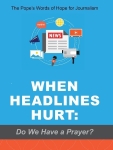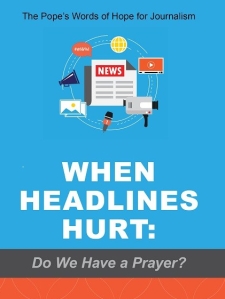#WhenHeadlinesHurt – Values to Renew “What’s New”


See below:
- Information on Bill’s podcasts/broadcasts and public presentations. (See OnWord.net, Twitter) ….. Co-hosted podcasts: EncounterPoints & That’s So Second Millennium!
- An overview of Bill’s perspectives on Catholic values that can help in renewal at the intersection of our communications media experiences and social polarization.
Links to Podcast/Broadcast Appearances (2019-2020)
- “Catholic Radio Indianapolis”–interviewed by Brigid Ayers and Jim Ganley on “Faith in Action.” A Catholic View of Social Distancing. Hear the May 22 podcast.
- “A Closer Look” — interviewed by Sheila Liaugminas on Redeemer Radio network. Catholic values & World Communications Day. Hear me around 26:39 mark, May 20
- “Son Rise Morning Show” — interviewed by Matt Swaim about COVID-19 pandemic: social polarization and “social distancing” (April 28, go to 2 hr 40 min)
- “Living Stones” — weekly program hosted by Deacon Harold Burke-Sivers and Ken Hallenius–community, communications, and COVID-19–March 23, 2020 episode
- “Living Stones” — discussion on social communication and Catholic values Feb. 28
- “Kresta in the Afternoon” — discussion of political reporting on America’s cultural divide, geared toward PBS documentary and Catholic values, on Jan. 23, 2020
- “Son Rise Morning Show” — interviewed by Matt Swaim about Pope Francis commentaries regarding renewal of communication: 10 mins into show Jan. 9, 2020
- “The Kyle Heimann Show” — interviewed about 2020 message for World Communications Day. Redeemer Radio (Fort Wayne-South Bend) Jan. 28, 2020
- “A Closer Look” — Relevant Radio’s daily national program on topics in the news, hosted by Shelia Liaugminas: interview on renewal of media use, Nov. 18, 2019
- “Living Stones” — weekly syndicated show on numerous Catholic radio stations, featured guest for two-part interview on media, social polarization and young people; hosted by Deacon Harold Burke-Sivers and Ken Hallenius, July 1–July 8, 2019
- “The Kyle Heimann Show” — substitute host on daily Redeemer Radio morning show: a live hour of discussion on media and social polarization, interviews with media leaders, June 13, 2019
- “Son Rise Morning Show“–heard daily on Catholic radio stations nationwide. Interviewed by co-host Matt Swaim about the book on March 25, 2019. Go to the 6:30 am point in the SoundCloud recording from that day.
- “Catholic Connections with Teresa Tomeo”–the daily radio show that probes relationships between Catholic values and current news, including social divisions worsened by journalistic/media trends. Hear Feb. 4, 2019 archive: hour 2 at 17:00.
- “Church Life Today”–-the weekly radio program and podcast produced by the McGrath Institute for Church LIfe at the University of Notre Dame. Hear the Oct. 6, 2018, archive.
- “Lisa Hendey and Friends”–the podcast hosted by a nationally respected Catholic blogger, author and commentator. Hear our conversation from July 2018 at this site.
- “Kresta in the Afternoon”–Al Kresta’s national radio show. Go to the archives, then download hour one for June 12, 2018; hear me at the 23:00 mark.
Written Media and Public Presentations
- World Communications Day 2020 —guest column in Today’s Catholic (May 18 2020)
Feb. 17, 2020, “Catholic Values and Renewing Social Discourse”, Holy Cross Parish, S.B.
Oct. 1, 2019, “Theology on Tap” talk/Q&A on media, news, and Christian values.
Sept. 7, 2019: St. Therese Little Flower Parish, South Bend. “How to Renew the News”
Aug. 24, 2019: Talk and Q&A with students, “Saints & Scholars” — Holy Cross College
Aug. 17, 2019: Talk and Q&A with students, “Saints & Scholars” — Holy Cross College
April 8, 2019: Knights of Columbus Council 553
April 7, 2018: Knights of Columbus, St. Therese Little Flower Council, South Bend
Buy the book, When Headlines Hurt: Do We Have a Prayer, by Bill Schmitt; Catholic Writers Guild Seal of Approval 2019
There’s a second kind of “climate change”—this one in our culture. It generates heat without light through conflict in civil society and causes personal pain through erosion of dignity and hope. Like the weather, we gripe about it, but we don’t know what to do about it. We can’t agree on solutions to pursue together or even reach clarity on what problems are ripe for real discussion. You might say the mix of challenges constitutes a “perfect storm” summoning us to serve through damage prevention and reconstruction.
This multi-dimensional problem, which creates major hurdles against achieving goals of secular solidarity and missionary discipleship, is a combination of social polarization and eroded conversation. It is building momentum these days, at the intersection where journalism and our changing news environment meet politics and our changing technological environment. It’s arising amid confusion and disagreement about values, approaches and purpose, fed by disenchantment with traditional ideas plus attempts to confront new, complex issues in the modern style of self-centered moralism and relativism.
We need to get back to basics about such values as the common good, the pursuit of peace and other “rules of engagement” among people—such as mercy, justice, patient accompaniment and personal accountability—about which the Catholic Church provides time-tested insights. Pope Francis is one of the few world leaders and opinion-shapers who is seeking to spotlight these resources as relevant, connection-making remedies, not outmoded attacks on personal freedom. He talks about them, in compelling ways, through his messages for World Communications Day. He also addresses the dangers our “digitized” culture poses, especially toward young people and the future of communities, local and global.
Bill Schmitt’s book, When Headlines Hurt: Do We Have a Prayer?, published in 2018, is the groundwork for an effort to help all people of good will address this problem, tapping into Church wisdom and a Franciscan spirit while remaining inclusive and attuned to today’s perspectives. Bill’s endeavors for thought-leadership through blogs, podcasts, public speaking and ecumenical, non-partisan awareness-building seek practical goals with the transformative assistance of faith. Bill would like to explain more about the prospects for renewal he sees in communication and information. He’d like to start discussions—first at the grass-roots level, among people like you. Parishes and church groups will enjoy rediscovering the power of faith and reason, truth and love, not only to evangelize, but to cooperate with the secular world in preserving rights and responsibilities, debate and problem-solving.
That’s the essence of the “When Headlines Hurt—Values to Renew ”What’s New” project. Invite Bill to bring his reflections and research, based in the messages of Pope Francis and Saint Francis among others, to a discussion group as contemporary as today’s headlines and newsfeeds.
Recently interviewed on radio by Deacon Harold Burke-Sivers and Ken Hallenius for their syndicated program, “Living Stones.”
I discuss communications in the Church (Feb. 28)
I discuss “social distancing” and its implications (March 23).
Latest podcast-hosting/interviewing for science-and-religion series, “That’s So Second Millennium.” Subject: A new “formation” website for the Secular Franciscan Order. http://thatssosecondmillennium.net
New contributor to Catholic Journal blog. One of my posts on social distancing and its implications was published on April 11.
https://www.catholicjournal.us/2020/04/11/social-distancing/
New contributor to two websites reflecting Franciscan thought with blog posts from members of the Secular Franciscan Order.
For the “ongoing formation” site OFSongoing, “Pope Francis: Draw Near”
For the “Tau Ministries” site of David Seitz, OFS, Review of “The Irishman”
Latest episode in a podcast I co-host to discuss Church resources guiding improved social communications—episode 3 in series 3 of “EncounterPoints” with Ken Hallenius. Discussion of papal messages for World Communications Day.
http://www.encounterpoints.com/
New post published March 3 in the McGrath Institute for Church Life blog at Notre Dame: Renewing communication and valuing the pursuit of truth:
https://mcgrathblog.nd.edu/small-talk-and-big-appetites-for-truth-in-communications
(Another recent entry in the same blog: my review of film, “The Irishman.”) https://mcgrathblog.nd.edu/and-the-nominees-are-best-picture-the-irishman
Latest online feature story for Purdue University College of Engineering—a student “rocketeer” whose leadership as a woman in the field yields benefits across many frontiers. (posted in February)
Recently interviewed on radio about Pope Francis’ message for the 2020 World Communications Day. See January 28 podcast here: https://www.kyleheimann.com/show832story/
Also interviewed by Kyle about social distancing and implications (March podcast)
(Interviewed by Deacon Harold Burke-Sivers in January about recent papal remarks on social polarization and improved civil discourse:) https://materdeiradio.com/episode-240-screen-time/
New entries in my OnWord.net blog about Social Distancing. Tying the subject together many of the pope’s insights on the need for renewal in our media and civil discourse: http://OnWord.net
See material about my book and thought-leadership
Presented lecture to parish group’s February 2020 meeting at Holy Cross Parish in South Bend. The talk, based on my book about social polarization and Christian values to renew communications (When Headlines Hurt: Do We Have a Prayer?), prompted favorable comments in the Pastor’s Column. (see p. 3, Feb. 23 bulletin)
Podcast/Broadcast Appearances (2019-2020)
- “Son Rise Morning Show” — Interviewed by Matt Swaim about COVID-19 pandemic: social polarization and “social distancing” (April 28, go to 2 hr 40 min)
- “Living Stones” — weekly program hosted by Deacon Harold Burke-Sivers and Ken Hallenius–community, communications, and COVID-19–March 23, 2020 episode
- “Living Stones” — discussion on social communication and Catholic values Feb. 28
- “Kresta in the Afternoon” — discussion of political reporting on America’s cultural divide, geared toward PBS documentary and Catholic values, on Jan. 23, 2020
- “Son Rise Morning Show” — interviewed by Matt Swaim about Pope Francis commentaries regarding renewal of communication: 10 mins into show Jan. 9, 2020
- “The Kyle Heimann Show” — interviewed about Pope Francis’ 2020 message for World Communications Day, on Jan. 28, 2020
- “A Closer Look” — Relevant Radio’s daily national program on topics in the news, hosted by Shelia Liaugminas: interview on renewal of media use, Nov. 18, 2019
- “Living Stones” — weekly syndicated show on numerous Catholic radio stations, featured guest for two-part interview on media, social polarization and young people; hosted by Deacon Harold Burke-Sivers and Ken Hallenius, July 1–July 8, 2019
- “The Kyle Heimann Show” — substitute host on daily Redeemer Radio morning show: a live hour of discussion on media and social polarization, interviews with media leaders, June 13, 2019
- “Son Rise Morning Show“–heard daily on Catholic radio stations nationwide. Interviewed by co-host Matt Swaim about the book on March 25, 2019. Go to the 6:30 am point in the SoundCloud recording from that day.
- “Catholic Connections with Teresa Tomeo”–the daily radio show that probes relationships between Catholic values and current news, including social divisions worsened by journalistic/media trends. Hear Feb. 4, 2019 archive: hour 2 at 17:00.
- “Church Life Today”–-the weekly radio program and podcast produced by the McGrath Institute for Church LIfe at the University of Notre Dame. Hear the Oct. 6, 2018, archive.
- “Lisa Hendey and Friends”–the podcast hosted by a nationally respected Catholic blogger, author and commentator. Hear our conversation from July 2018 at this site.
- “Kresta in the Afternoon”–Al Kresta’s national radio show. Go to the archives, then download hour one for June 12, 2018; hear me at the 23:00 mark.
Public Presentations
Feb. 17, 2020, “Catholic Values and Renewing Social Discourse”, Holy Cross Parish, S.B.
Oct. 1, 2019, “Theology on Tap” talk/Q&A on media, news, and Christian values.
Sept. 7, 2019: St. Therese Little Flower Parish, South Bend. “How to Renew the News”
Aug. 24, 2019: Talk and Q&A with students, “Saints & Scholars” — Holy Cross College
Aug. 17, 2019: Talk and Q&A with students, “Saints & Scholars” — Holy Cross College
April 8, 2019: Knights of Columbus Council 553
April 7, 2018: Knights of Columbus, St. Therese Little Flower Council, South Bend
Overview: The Role of Catholic Values Where Media Experiences and Social Polarization Intersect


By this point, Catholics listening to Pope Francis’ ongoing messages to the world can feel comfortable that renewing social communication–in all its forms (especially in the digital realm), in the Church and in the secular sphere, among faith-based people and “nones” alike–is one of his priorities. He spoke about it again in his Pentecost homily this past Sunday, connecting to the Holy Spirit’s work of peace-building some key themes he has raised in “Christus Vivit,” his 2019 exhortation to young people, as well as in his 2018 and 2019 messags for World Communications Day.
I believe he’s saying we need to help bring Christian values back into our understanding of what constitutes fruitful journalistic communication. So many people are playing the journalist, not only consuming news but generating news through their social media, sometimes without a sense of accountability for toxic thoughts they’re soaking in and emotions they’re promulgating. Pope Francis offers pastoral advice regarding the lively cyberspace exchanges of information, our dual roles as news consumers and news generators, the spirit of purpose and pleasure we must bring to community conversations, and the respect for complex human dignity and the sense of receptivity we should bring to encounters in the public square. Defaming others without accountability, short attention spans that jump to conclusions, oversimplified labels dismissing people, and the manipulation of truth are reducing our mutual trust and our hope that democracy can exercise its ability to solve problems for the common good.
In his Pentecost homily, Pope Francis cautioned that, “in the age of the computer,” we feel more distanced and isolated from each other, and “the more we use the social media, the less social we are becoming.” We are at risk of spreading “a culture of lies.” You can see his full homily here.
He also spoke in recent weeks about the dangers (as well as the benefits) of our digitzed culture as a home where so many young people reside. In “Christus Vivit,” his exhortation drew from the Synod on Youth that took place in Rome in 2019. He sounded cautionary notes that should make parents carefully consider how to keep our kids learning and growing (as participants in civil society and Church life) during the “summer break.”
Catholics of all ages need to understand their faith and their values better in a world where popular culture no longer affirms these things. As politics join the summer weather in heating up, policy issues may accentuate bitter local debates that many previously ignored, and local expressions of free speech and exercise of religious values may confront reduced tolerance. Summer is a great time to journey in explorations of truth among different people who can be met in charity and peaceful, relaxed solidarity.
We parents are tempted to become lax about the school year disciplines encouraging young people to learn and foster community life in the context of Christian values We invite kids to have vacation fun while forgetting that the digital culture is one where they might be sidetracked into artificial realities and self-created identities. A value-started life may be captured by the entertainment offered by corporate interests, or by the extremist energies of activists who place enragement over engagement, income over instruction, sensation over common sense.
The Holy Father said this in his exhortation:
“Today’s media culture creates a deep sense of orphanood. We need to build fraternial environments” in our parishes, as well as in our communities and families, where young people can rise above isolation and experience a sense of belonging and shared purpose.” Rather than being distracted by video games, they deserve to be in places of multigenerational dialogue, memory, aspirations and action attuned to the the things that matter most in life.” (Christus Vivit, paragraph 216)
These messages align with Pope Francis’ 2018 and 2019 messages for World Communications Day (an annual pause for reflection, initiated by the Second Vatican Council and its document Inter Mirifica), In the 2019 message, he cautioned that the “community” model practiced in social media is too often one of excluding people and ideas with which you differ. The Church idea of community, he said, is based on communion–something higher that brings us together in humility with similar beliefs and motivations. The Eucharist and other sacraments make us more aware of our shared identity as a Body of Christ that is one although we comprise many parts, all of which have uniquely beautiful, God-given gifts to be shared.
The pope’s 2018 message called for a “journalism of peace” that proactively asks deeper questions in order to help us find areas of common ground, plus “education for truth” that springs from journalists valuing the truth and inspiring others to seek conformity with reality. A relativism that allows us to define our own truths on the basis of emotion and individually-defined primacy can otherwise combine with an urgent moralism–a sense of right and wrong that should be maintained–but one that unilaterally judges who is wrong–who is an evil force by dint of strongly held beliefs and therefore not someone we can learn from or engage with because they recognize a higher power.
A growing body of work by the Pope is telling us we have a kind of additional curriculum for teaching and practicing an evangelization that heals the culture and brings us together at the societal and individual level. It’s got to be based on a personal, receptive relationship with the Lord–through the Holy Spirit’s everyday influence on our lives, as stated in the new Pentecost homily. That gives us the love and forgiveness by which we can communicate with others as merciful fellow sinners, fellow seekers of truth who can find great joy and encouragement in local avenues of discovery. We’re not denying the truth, the way and the life, but we’re following Him rather than sitting on the beach in judgment of others or marching off in war against them.
Pentecost has helped to bring us to a summer break where we can some the time to be more reflective and receptive about the best ways to work together. The Paraclete will help us to speak in ways that others understand. Our faith in Christ and our communion through the sacraments and the “Amen” we say together at every liturgy will help to focus on things we can do, especially as a mix of old and young, rich and poor, robust Catholic and open-minded “none,” so long as we stay in motion–not leaving a vacuum of laziness or elitism-in-a-bubble. Into such vacuums can be injected popular culture’s tendencies toward narcissim, isolation and escape from painful realities.
Pope Franics reminded us in the 2018 World Communications Day message, about which I wrote a book of reflections and research, that we must be instruments of peace and stewards of the news, including the “Good News” and the bad news, sharing a sense of sacrifice, wonder and duty that brings us together, rather than driving us apart. Note that the pontiff’s 2018 message ends with a version of the Peace Prayer of Saint Francis in which fully engaged communicators (“love always commuicates,” the pope has said) have to put our lives where our words are.
I’m committed to encouraging fellow Catholics about the power of inclusive conversation, embracing both faith and reason, that our use of digital media can produce great fruits if we understand that it entails both rights and responsibilities, faith and reason, minds and hearts, smiles and tears, the use of remarkable communication tools and an impulse toward flesh-and-blood community where “many parts” all enjoy freedom and authenticity in recognition of the really real.
As Francis said on Pentecost Sunday, ” the Spirit is far from being an abstract reality; he is the Person who is the most concrete and close.” He is the one who changes our lives by immersing us in the love and grace of God if we allow him to–in between the latest video games and summertime distractions. Self-satisfied temptations to lounge around, ignorant while others are defamed, excluded, and orphaned, make our summer vocations unsustainable. We must accompany all persons of infinite worth, whom the pontiff describes as “the heart of the news.” These are the stories that should be trending.
